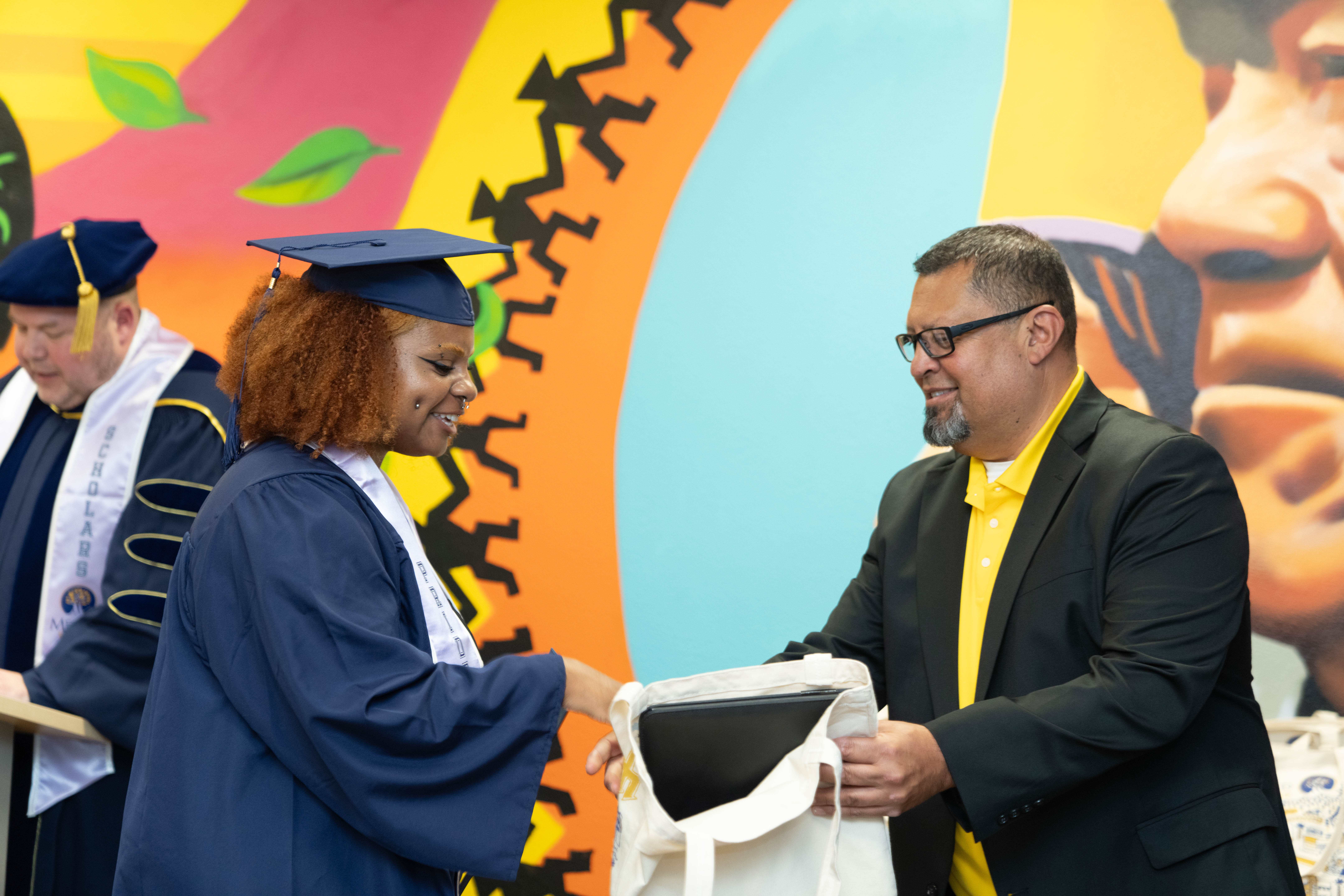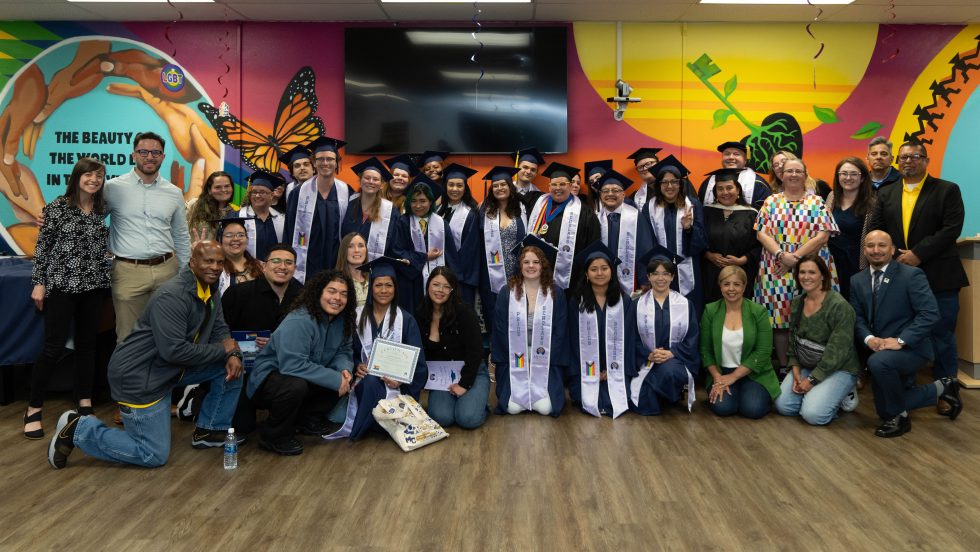To celebrate someone, you have to see them.
That was the goal and the point behind the inaugural Lavender Graduation celebration for LGBTQIA+ students at Merced College on April 26.
Merced College sophomore Lukas Hammett, a transgender man, pushed for an event where people could applaud LGBTQIA+ students for their accomplishments.
“Having this celebration was really cool,” said Hammett, who is graduating this month with Associate in Arts for Transfer degrees in Math, Physics, Computer Science and Psychology. “The ceremony, campus Pride Month and the new HEARTS Club — they’ve all fostered a stronger sense of community for LGBTQIA+ people at Merced College.”
Twenty students, wearing blue graduation gowns and lavender stoles, with staff, family and allies, took over the Equity Hub late last month for the celebration. Hammett and Merced College President Chris Vitelli both spoke before Kat Fobear, a women’s studies professor at Fresno State, gave the keynote address.
Fobear, a queer scholar, helped establish the first LGBTQIA+ minor at Fresno State, with Merced College Philosophy Professor Jacki Alvarez. Fobear is also heavily involved in Qistory Fresno, an organization that preserves the queer history of California’s Central Valley.
“It was a big deal and pretty exciting overall to bring something new to the college,” said Merced College EOPS Coordinator and Equity Counselor Cimmaron Ruiz, who helped organize the event. “Those 20 students had earned 27 transfer degrees and five regular associate degrees. They are scholars. When we call them Pride Scholars, ‘Pride’ refers to their identity. ‘Scholars’ refers to their academic achievements and potential.”
Lavender Graduation is the brainchild of Ronni Sanlo, a Jewish lesbian and university professor who was barred from the graduations of her biological children because of her sexual orientation. She created the first Lavender Graduation for three students at the University of Michigan in 1995, and the tradition spread to over 45 campuses by 2001.
The color lavender references a combination of the pink and black triangles once used to identify and discriminate against gays and lesbians in Nazi Germany.
“Even though our oppression looks different today, it still exists,” said Alvarez, who identifies as a queer woman and is part of the college’s Lavender Faculty Interest Group.
“It’s not just that suicide rates in the LGBTQIA+ community are extremely high. Our community is marginalized and faces disproportionate amounts of violence. So why Lavender Graduation? It’s necessary so people who face those obstacles can also be celebrated.”
Students like Hammett should be celebrated, with his four degrees and transfer acceptance into all seven University of California campuses to which he applied. He also started this effort last fall by asking about programs for LGBTQIA+ students and suggesting others.

“I wanted more public-facing activities,” Hammett said. “I was president of a different club on campus, but I wanted to reach out to other trans and queer people.”
Hammett founded the HEARTS (Humans Embracing Alliance Romance Transidentity Sexuality) Club last semester. He was motivated knowing how much more could be done for Merced College’s LGBTQIA+ students, staff and faculty.
“I’ve been at Merced College for three years, and my first two years, I never made any connections with anyone,” Hammett said. “I felt too different. I’m a STEM student and STEM is very cisgender male-dominated. Even though I am male, I’m also trans and queer. Since Lavender Grad, HEARTS Club, Pride Scholars and Pride Month came to fruition, I feel like my life is rising and improving. I feel like part of the campus. I’m not afraid to show who I am.”
Alvarez worked with Hammett and Ruiz throughout the year to expand Pride Scholars offerings. That continues the mission she and Fobear began at Fresno State to work with other nonprofit activists to promote inclusion throughout the Central Valley.
She felt drawn to Hammett’s cause, and said she wanted to join the Merced College faculty two years ago because she felt fully accepted here as a scholar and as herself.
“I’m an adult who is visibly queer,” Alvarez said. “I have a shaved head. I have tattoos. I don’t look like most of my colleagues. Unfortunately that openness comes at a cost. But the LGBTQIA+ community is not a homogenous group. It includes sexuality, gender and biological designations. The idea that people on the periphery of society can now stand in solidarity with our allies, to celebrate something like graduation, is so powerful.”
Lavender Graduation concluded campus Pride Month, which is typically celebrated in June but held at Merced College in April since many students are gone during the summer. Pride Scholars collaborated with Central Valley Pride, the Valley Crisis Center and the college’s RSVP Program to welcome a student band, run a queer short film festival night, and hold a panel discussion that included a Mexican student detailing the cultural barriers she faced to coming out.
“We’ve done so much in such a short time,” Ruiz said. “We’re wondering where all of this will take us. If we can’t keep this ball rolling for our students, then we’ve done all of this for nothing. So we are very committed to this work.”
During those lively, happy hours at the Lavender Graduation on April 26, graduates mugged for photos, listened to speeches and received certificates of acknowledgement. They will receive their official Merced College diplomas at commencement on May 23-24.
“So often when getting together with the LGBTQIA+ community, like the Trans Day of Remembrance, we’re acknowledging people who have died,” Alvarez said. “I cannot help reflecting now on how the world is better.
“It’s a truly happy thing when you belong to a college or a job or a school where they support you. Merced College students can feel fully accepted and welcomed. Lavender Graduation is when we can say, ‘Hey, look at what we’re doing now. We’ve achieved something. We’re looking at greatness in our futures. Here is our joy.’”
